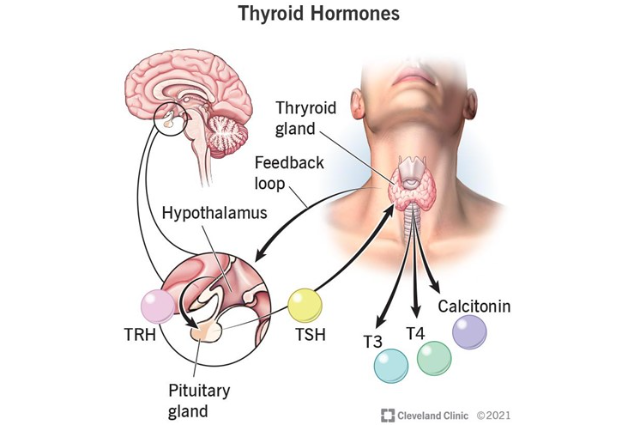
Photo by Philippe Murray-Pietsch on Unsplash
Thyroid – A Silent Slayer
In India, on average one in every ten people is diagnosed with thyroid disorder and more than 44 % of pregnant women face issues with a thyroid disorder. A key factor is that more than 60 % of the condition goes undiagnosed as well. This condition is more of a lifestyle condition. Recent studies state that more than 30% of people suffering from diabetes and 40% of people having PCOD may have underlying thyroid conditions left undiagnosed. This is a rising concern, especially in young women who need a check. Educating and keeping ourselves aware of the leading causes and avoiding them at the root can help create a healthy family and the next generation without lifelong medication.
The Metabolic Master Gland
This butterfly-shaped endocrine gland is present in the neck region. In major this gland produces the below hormones that are produced, stored, and allowed to enter into the bloodstream to carry out bodily activities. The thyroid is a major gland that takes care of the below activities in the human body.
- It controls fat and carbohydrate metabolism and ultimately supplying the energy to the cells
- Respiration
- Body Temperature Control
- Brain Development
- Cholesterol Levels
- The Heart and Nervous System
- Blood Calcium Levels
- Reproductive and Menstrual flow in women
- Skin Integrity
Hence inadequate function of this gland is likely to make an impact in the above activities of the human body. The above functions are of higher priority in the human body and often to avoid complications lifelong medications are suggested unless there is significant progress in the symptoms
The Hormonal Play
Though the thyroid produces the below hormones the initial stimulation to this gland happens from the Pituitary gland through TSH(Thyroid Stimulating Hormone). This being the trigger helps the thyroid gland produce the below hormones
- T4 –Thyroxine
- T3-Triiodothyronine
- Calcitonin
- Parathyroid Hormones
Among the hormones mentioned above T4 is the most available form which is later converted to T3 for communication at the cellular level for energy transfer. Often Free T4 is the most important hormone to measure as they are the first to change. Calcitonin and Parathyroid hormones play a crucial role as decision-makers in the body's calcium levels.
Symptoms & Root causes to look for.
The thyroid gland symptoms include few or all of the below mentioned, and the symptoms usually differ based on the type of thyroid condition they are associated with. In general, they face
- Fatigue
- Hair loss
- Sleep Issues
- Weight Management Issues
In Specific the symptoms of Hypothyroidism(Inadequate thyroid levels) include:
- Cold Intolerance
- Weight Gain
- Decreased Sweating
- Constipation
- Irregular and Heavy Periods
- Brittle Nails
- Slow Heart Rate
- Muscle and Joint Pain
- Puffy Face
- Depression and Irritability
In Specific, the symptoms of Hyperthyroidism(Thyroid Hormones in Surplus) include:
- Weight loss or gain
- Short or light periods
- Increased Sweating
- Racing Heart
- Nervousness and Anxiety
- Diarrhea
- Heat Intolerance
- Thick Nails
- Insomnia
- Hair loss
This silent metabolic disorder needs to be taken care of because it is the gland that controls the overall energy supply to the body at the cellular level. T3 and T4 synthesis happening in this gland acts like a port that transmutes energy into the cell. Every cell has a port to receive this T3 hormone and often when there is a malfunction happening in supplying the cells with T3 when there is not enough synthesis of T4 or Even when TSH (Thyroid Stimulating Hormone) production is inadequate at the pituitary level this metabolic condition is identified. It is important to understand the symptoms and approach a healthcare professional to understand the required lifestyle and nutritional requirements.
Though with proper medical practices, the condition can be managed well, understanding the cause and addressing its roots can help a better healing.
Often thyroid is a metabolic condition and the causes range from environmental factors, lifestyle disorders, and certain health conditions including pregnancy and genetic reasons. It can be broadly categorized as from birth (congenital hypothyroidism) or acquired condition. Now let us look into prime factors that cause causes acquired conditions in human beings:
- Nodules in the very gland that promotes its dysfunction
- Iodine and Micronutritional Deficiencies in the body
- Thyroiditis
- Pituatory gland dysfunction
- Side effects of other medications.
- Autoimmune (A Rare condition)
Nutrition and Food
Any condition in the human body associated with metabolism needs to be understood from the roots and treated with the cellular and nutritional requirements of the body. Any individual required calorie requirements, macro and micronutritional requirements though appear general, are unique based on gender, lifestyle, and physical activities. Inadequate or excess of any of the daily nutritional requirements in the long term can create serious health-related concerns in the long run. Specifically, foods that are highly processed and rich in goitrogens are to be avoided and foods that meet enough protein, carbs, fiber, and fat are recommended.
Considering micronutrients,Zinc, Selenium, Vitamin D, Calcium, Healthy fats, and Chromium play a crucial role. Let us now look into foods that are very good sources of zinc, Brazil nuts, beans, and legumes are great sources of zinc and many other vital nutrients. Eggs and non-vegetarian sources like eggs, and lean meat can help the body receive the required amounts of Vitamin D. Finger millet, and sesame seeds are good sources of Calcium too. Curd and milk products can be consumed if not lactose intolerance.
Lifestyle Changes
Lifestyle changes that are unhealthy and with less physical activity are found to be one of the biggest contributors to creating lifestyle and metabolic disorders in human beings. It is essential to identify a daily physical exercise routine that can help maintain the optimal metabolic rate of the body.A good 30-minute walk can reduce stress and ease anxiety. In this era of rushed and fast-paced progress, it is important to take a pause and think for a while about helping the body better align to nature.
Here are some lifestyle changes that can help support thyroid health:
- Diet: Eat a balanced diet rich in whole foods, fruits, vegetables, whole grains, lean proteins, and healthy fats. Include thyroid-supporting foods like iodized salt, seaweed, and omega-3 fatty acids. Drink your food and eat your fluids. Chewing the food well is the first step that can potentially make a huge difference.
- Hydration: Drink an adequate amount of water to help your thyroid function properly.
- Exercise: Engage in regular physical activity, like walking, yoga, or swimming, to help reduce stress and promote overall health.
- Stress management: Practice stress-reducing techniques like meditation, deep breathing, relaxation, or mindfulness to help manage stress, which can impact thyroid function.
- Sleep: Aim for 7-8 hours of sleep per night to help regulate thyroid hormones.
- Avoid endocrine disruptors: Limit exposure to chemicals like BPA, phthalates, and perchlorates, which can interfere with thyroid function.
- Get enough iodine: Ensure adequate iodine intake through iodized salt, seaweed, or supplements, as iodine is essential for thyroid function.
- Avoid soy and cruciferous vegetables in excess: While these foods are healthy, excessive consumption may interfere with thyroid function due to increased levels of goitrogens in them. Goitrogens in certain foods can potentially interfere with glandular function and hence not recommended.
- Consider supplements: Certain supplements like selenium, zinc, and ashwagandha may support thyroid health. Consult with a healthcare professional before adding supplements.
- Regular check-ups: Monitor your thyroid health with regular check-ups and blood tests to ensure your thyroid is functioning properly.
Remember, individual needs may vary, so consult with a healthcare professional before making significant lifestyle changes.
Is Thyroid that serious?
Yes, thyroid issues can be serious if left untreated or poorly managed. The thyroid gland plays a vital role in regulating metabolism, growth, and development. Thyroid disorders can impact various bodily functions, leading to:
- Metabolic problems: Weight changes, fatigue, and temperature sensitivity.
- Energy and mood: Fatigue, depression, anxiety, and mood swings.
- Hair, skin, and nails: Hair loss, dry skin, and brittle nails.
- Heart health: Increased risk of heart disease, high cholesterol, and cardiac arrhythmias.
- Fertility and pregnancy: Issues with conception, miscarriage, and pregnancy complications.
- Bone health: Osteoporosis and increased risk of fractures.
- Cognitive function: Memory problems, difficulty concentrating, and decreased cognitive performance.
Don’ts
- Don't ignore symptoms: If you experience fatigue, weight changes, or mood swings, consult a healthcare professional.
- Don't skip medication: Consistency is key when managing thyroid hormone levels.
- Don't overdo it: Avoid excessive exercise, which can put additional stress on your thyroid.
- Don't consume excessive iodine: While iodine is essential, excessive intake can harm your thyroid.
- Don't smoke: Smoking can worsen thyroid conditions and overall health.
- Don't neglect mental health: Thyroid issues can impact mental well-being; seek support if needed.
- Don't delay treatment: Prompt treatment can help prevent long-term complications.
- Don't self-medicate: Consult a healthcare professional before taking supplements or medications.
The Support of Yoga and Mudras
Yoga postures like Surya Namarkasr.The lioness poses and deer practice can help an individual to boost hormonal health. Approaching a yogic practitioner or a community can help to establish the right habit in the initial stages as they can help you as a silent accountability partner.
Certain yoga poses can help support thyroid health by stimulating the neck and throat area, improving circulation, and reducing stress. Here are some beneficial yoga poses for thyroid health:
- Cobra Pose (Bhujangasana): Opens up the chest and neck, improving circulation and reducing stress.
- Cat-Cow Pose (Marjaryasana-Bitilasana): Gentle stretch for the neck and throat area.
- Downward-Facing Dog (Adho Mukha Svanasana): Stretches the neck and throat, improving circulation.
- Seated Forward Fold (Paschimottanasana): Stretches the neck, throat, and shoulders, reducing stress.
- Sphinx Pose (Salamba Bhujangasana): Strengthens the neck and shoulder muscles, improving posture.
- Plow Pose (Halasana): Stimulates the thyroid gland and neck area.
- Shoulder Stand (Viparita Karani): Helps stimulate the thyroid gland and improves circulation.
Mudras are ancient yoga gestures that can help balance the body's energy and support thyroid health. Here are some mudras that may be beneficial for the thyroid:
1. Jalandhara Bandha Mudra:
This mudra stimulates the thyroid gland and helps regulate metabolism.
- Touch the tip of your chin to your chest.
- Keep your head straight and shoulders relaxed.
- Hold for 5-10 breaths.
2. Akash Mudra:
This mudra helps balance the thyroid and parathyroid glands.
- Touch the tip of your middle finger to the base of your thumb.
- Extend your other fingers.
- Hold for 5-10 breaths.
3. Prana Mudra:
This mudra stimulates the thyroid and supports overall energy.
- Touch the tip of your ring and little fingers to the tip of your thumb.
- Extend your other fingers.
- Hold for 5-10 breaths.
4. Sarvangasana Mudra:
This mudra targets the neck and shoulder area, supporting thyroid function.
- Place your hands behind your back, interlocking your fingers.
- Inhale and arch your chest, keeping your head straight.
- Hold for 5-10 breaths.
Remember to practice yoga and Mudra gently and within your comfort zone, especially if you have any underlying health conditions. Consult with a healthcare professional or yoga therapist for personalized guidance.
Conclusion
Thyroid disorders are complex and multifaceted conditions that require comprehensive management and care. By understanding the intricacies of thyroid function and the impact of thyroid disorders on overall health, healthcare providers can deliver personalized and effective treatment plans. Through a combination of medication, lifestyle modifications, and alternative therapies like yoga and mudras, individuals with thyroid conditions can achieve optimal thyroid function and improve their quality of life. By prioritizing thyroid health and promoting awareness, we can empower individuals to take control of their well-being and thrive in the face of thyroid challenges.
. . .
References:

